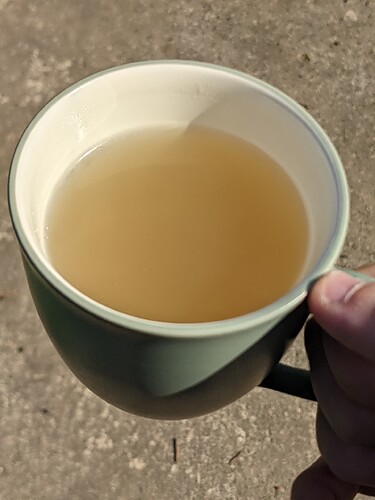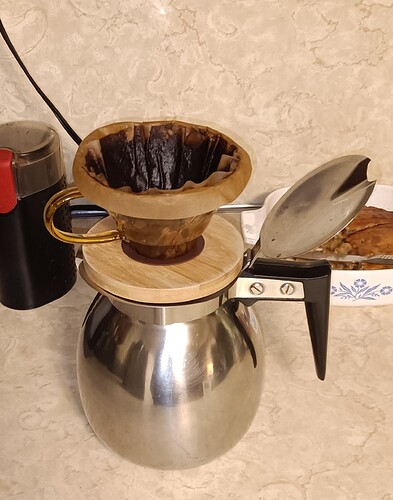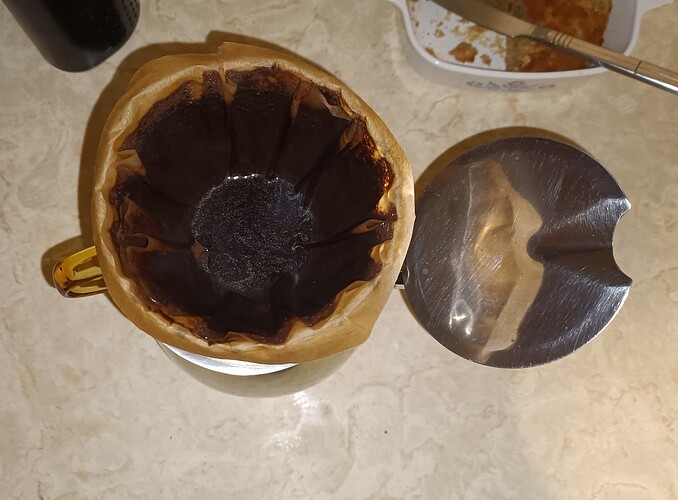Used to take my kids to the carousel in Nederland all the time. Great little town.
Hoping to move out there very soon actually
I like adding a hefty dose of Delta 8 distillate to my coffee
I finally gave that green coffee a whack.
First of all the beans are much too hard to be run in an ordinary coffee grinder. They backed mine up immediately. My spice grinder did a better job but still struggled to get it evenly ground.
Then i let it steep in the french press for 5 minutes. But i was concerned given the hardness of the beans and the fact that there were still a lot of big chunks left, how thorough the extraction was. I wonder if the traditional "boil them for 20 minutes) method might not be better after all.
Anyway, i yielded this:
It has a delicious herbal flavor and looks like cloudy green tea. No hint of bitterness at all. It tastes nothing like roast coffee.
I would happily drink more of this. I’d need to figure out a better grinding method though.
rock tumbler ball mill?
Something like that.
Maybe a stainless conical burr grinder?
That’s what happens when you grind it to powder and use your French press then filter it over a Pour over.
If your into expresso… I suggest try KAMIRA. Stovetop brewer… one can modify with a new prv. spits out expresso in foam… best I tried so far.
I would because it seems if it’s faulty or jammed you end up like this dude.
Oddly enough I got a moka pot and about a week later I promptly threw it out due to the fact the brew wasnt all that it was cracked up to be. It was too strong and imo unless you have a digital heat controller attached to a coil it’s utterly worthless.
Sorry I was a little slow on the uptake, but here’s the quick response I got from him when I asked how we went about the Koji;
“It changes on % and such depending on bean but generally they are steamed to around 70% moisture, then inoculated with a koji strain. After that, they spend 2-3 weeks in the humidity/temp/airflow cabinet around 80% humidity and 90F.
After that, I dry them back out to roasting moisture content, then roast”
I’m using gas burner so I didnt have that issue… doesn’t look fun on induction at all… . I like strong coffe so I’m supa happy w it, just could use little more pressue, I find it better than regular espresso machine. I can get super thick brew with this.
my opinion of moka pots, or vacuum brewers, or any type of percolator-style brewer, is pretty low. temps are too high, you’re basically boiling any nuance out of your brew. they’re good for a spectacle but that’s about it.
i love the thinking you put into your methods ![]()
that’s compelling thanks for sharing! i gotta try that for myself sometime soon. i would share @anon64373531 's suspicion that a conical burr grinder could do the job, that style by a good brand simply can’t be beat for coffee grinding. they will, however, cost you a few hundred to a grand, even a nerd like me finds that nearly impossible to justify
DOPE contribution thank you, that gives me some rabbit holes to jump into.
at one of the big coffee conventions i volunteered for a class that roasters take to certify on, about the organic acids in coffee and how they play into roasting and tasting. as a training exercise, they had us prepare tasting sets to allow someone to experience these acids on a somewhat isolated basis, compared to the mix you find in a given brew.
we took a very ‘balanced’, almost bland coffee brew with no unique flavor characteristics–completely unremarkable. then, we made sets of two, one cup with this bland brew, then it’s pair a cup of bland brew with a few drops of diluted organic acids in it–
one set each of citric acid (lemony, zingy tartness), malic acid (green apple tart, not as zingy and longer-lasting), quinic acid (cranberry tart with a slight bitter pucker) and phosphoric acid (not so much a flavor as a refreshing ‘smack’).
this was a VERY cool experience. they went further into the chemical reactions going on inside the roaster, given time and temp, and how the growing conditions of the plant played into this–for example, if the nighttime temp around that grove was cooler than normal, the plant’s rate of respiration would be lower, thus not using up as many plant sugars, thus more sugars remain in the cherry and bean, which the roasting process can act on. and that’s just the acids, nevermind the complex mix of compounds alongside them.
check out the papers @Franklin posted earlier if you haven’t already, brings the variable of pressure into the roasting process in order to preserve these pyrazines and furans specifically, exciting stuff
how do you clean yours monthly? putting those little tablets inside of the portafilter with the grey rubber holder? mine for some reason doesnt allow me to enter a cleaning cycle manually and im only able to do it automatically once the machine recognizes a certain amount of “shots” and then the lights start blinking
Yeah unfortunately i can’t really invest that in something i might not use that much. The truth is i actually drink much more tea than coffee (which would be a good thread of it’s own). When you try it yourself please post the results though!
my family roasts small batch coffee out in california, i am a little bias but it is some of the best coffee i have ever had. Freshly roasted makes a HUGE difference www.krickcoffee.com is their business
Links to different coffee that you guys like?




